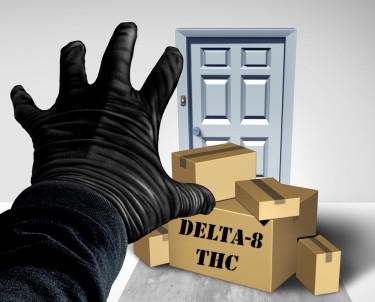
During the 2023 Supply Chain Conference in Houston, Texas, the Drug Enforcement Administration (DEA) recently declared that it would shortly release new regulations governing synthetic cannabis.
Terrance Boos, Section Chief of the DEA’s Drug and Chemical Evaluation Section, addressed at the conference on May 4 about new trends. The DEA has received “multiple petitions” involving synthetic cannabis, according to Boos, who also said that the agency is actively revising its regulations to take into account suggestions from the United States Department of Health and Human Services (HHS).
Background of Synthetic Cannabinoids
The proliferation of synthetic cannabinoids, including the increasingly popular delta-8 THC, has recently become a pressing issue. These artificial compounds are specifically designed to replicate the effects of THC, the primary psychoactive component found in cannabis. However, delta-8 THC, in particular, has presented unique challenges in terms of regulation and classification.
While minute quantities of delta-8 THC naturally occur in cannabis, the majority of delta-8 THC products are synthetically produced by chemically converting CBD into delta-8 THC. This manufacturing process raises concerns about these products’ legal status and oversight. To address these complexities, the DEA is poised to introduce new regulations that specifically address the classification and control of hemp-derived cannabinoids, including synthetic CBD and delta-8 THC.
Given the varying approaches adopted by different states, ranging from outright bans to partial regulations, there exists considerable confusion surrounding the legal standing of delta-8 THC. The forthcoming DEA rules seek to alleviate this confusion by offering clarity and establishing standardized regulations for synthetic cannabinoids such as delta-8 THC. Through these measures, the DEA aims to safeguard public health and ensure consumer safety in the face of emerging synthetic drug trends.
The DEA’s Facts and Findings
Boos’ PowerPoint presentation addressed a wide range of issues, including changes to prescription schedules, the production of fake pills, and drug trafficking via the Internet. A portion was devoted to the “decade of responding to the harm,” discussing the development of designer pharmaceuticals such as spice/bath salts, synthetic opioids, designer benzodiazepines, and synthetic cannabinoids “CBD to delta-8 THC.”
Boos pointed out that there may be plans to deschedule synthetic CBD because the “proposed rule treats synthetic CBD with 0.1% delta-9-THC same as AIA [agriculture improvement act] exempted material.”
A brief history of delta-8 THC was also discussed in the presentation, including its origins, production methods, states that have prohibited or restricted its use, and statistics showing the expected growth of delta-8 goods in 2021 and 2022. Boos stated that most products containing delta-8 THC are created through a chemical conversion of CBD into delta-8 THC and that the act of consuming that substance in any synthetic stage now puts it back within the purview of the Controlled Substances Act.
Boos acknowledged that the classification of cannabinoids generated from hemp may change under the new regulations, which have not been made public.
DEA’S Clarity and Regulations Regarding the Legal Status of Various Cannabinoids
Boos stated that the goal of the upcoming rulemaking is to give clarification and remove any doubt regarding the legal standing of various cannabinoids in light of the fact that hemp and its related products were made federally legal in the 2018 Farm Bill.
Since then, the market for cannabis-related goods, including edibles and tinctures, has grown quickly. And as a result of the emergence of psychoactive cannabinoids like delta-8 THC, state legislators all over the country have passed a patchwork of laws governing the items.
Insignificant levels of delta-8 THC naturally occur in cannabis, and the DEA has previously said that these uncontrolled natural components are present. However, the production of many goods is synthetic and involves a chemical reaction that changes CBD into delta-8 THC.
Boos stressed that while hemp and its naturally occurring derivatives were authorized, “synthetic tetrahydrocannabinol was not exempted” from the Controlled Substances Act (CSA).
Impending Rulemaking and Potential Legislative Changes
The new regulations might be coming shortly, per a quick review by Vicente LLP. Vicente LLP stated on its website that businesses needed to stay informed about the federal agencies’ ongoing marijuana and hemp scheduling work since it would affect whether cannabis products were permitted. “The DEA and FDA are currently prepared to make scheduling reforms for both hemp and cannabis, and significant congressional legislation like the 2023 Farm Bill could additionally alter the legal classification of some cannabis products.”
According to a statement on Vicente LLP’s website, they anticipate DEA to study the HHS recommendation, create its own analysis, and eventually submit a proposed regulation mirroring the FDA recommendations in the Federal Register. “There will thereafter be a chance for those with an interest to request on-the-record hearings and for the public to provide comments. Based on our best prediction, the proposed regulation will appear in the Federal Register this fall.
In Febuary, the DEA published a letter declaring that delta-9-THCO and delta-8-THCO are not hemp but are classified as prohibited drugs. Boos stated in the letter that delta-9-THCO and delta-8-THCO could not be derived naturally from the cannabis plant and must be manufactured instead; therefore, they do not meet the definition of hemp.
Understanding the FDA’s approach to cannabis research, policy, and regulation was the topic of a webinar the Food and Drug Administration (FDA) presented in October. Janet Woodcock, the FDA’s lead deputy commissioner, said during the debate that the FDA uses data from the National Institute for Drug Abuse (NIDA) to handle “the scientific and medical assessment” of cannabis. According to Woodcock, they are diligently looking at the scheduling of cannabis under the Controlled Substance Act along with the freedoms they may have here. The secretary of HHS is highly interested in that since it is a top priority. In addition to the assistant secretary for [HHS], we are actively collaborating with our partners at NIDA.
Woodcock did, however, affirm that the DEA “has the final word” when it comes to scheduling decisions. This restriction, she continued, makes it “very, very difficult” to do cannabis research under the current standards.
Bottom Line
The Drug Enforcement Administration (DEA) is set to publish new rules for synthetic cannabinoids in order to clarify their legal position. The rule that is being proposed attempts to clarify and regulate synthetic cannabinoids. The United States Department of Health and Human Services recommendations are taken into consideration when making the DEA’s decision, which seeks to match regulations with developing scientific understanding. According to the expected duration, a public comment period will come after the proposed rule’s publication in the Federal Register. The synthetic cannabis sector and its stakeholders will be impacted by these new regulations, forcing companies to adjust while guaranteeing that customers can buy these products more confidently. To manage the shifting legal environment for synthetic cannabis, ongoing cooperation and attention from all stakeholders are essential.
THE END OF THE HEMP INDUSTRY? READ ON…
THE DEA IS COMING FOR DELTA-8 THC, THE END OF THE HEMP INDUSTRY?
- SEO Powered Content & PR Distribution. Get Amplified Today.
- EVM Finance. Unified Interface for Decentralized Finance. Access Here.
- Quantum Media Group. IR/PR Amplified. Access Here.
- PlatoAiStream. Web3 Data Intelligence. Knowledge Amplified. Access Here.
- Source: http://cannabis.net/blog/opinion/no-more-loophole-for-you-the-dea-is-about-to-come-down-on-delta8-hhc-and-hempderived-products




